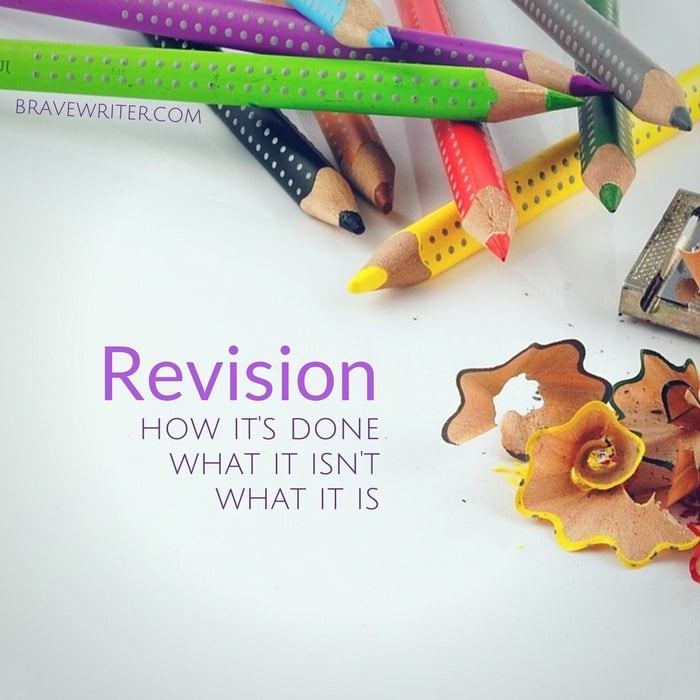Revision: How It’s Done

The most frequent question I get via email is how to revise a freewrite. I give lots of detail about how to do just that in The Writer’s Jungle and hope you’ll take advantage of one of our packages to get your own copy. Revision is rarely addressed in writing curricula. The typical “check list” approach to revision is a shadow of what true revision is all about.
The goal of a writing piece is to make it good to read. Simply double checking for writing elements and proper punctuation is not what takes a piece from raw writing to polished final copy. Revision is that critical step where the writer, with the help of an ally (editor, you), takes a fresh look at the original draft with an eye to improving it in essentials, in readability, in power.
Let’s look at revision philosophically then practically:
I separate the terms “editing” from “revising.” When they’re used interchangeably, the act of correcting mistakes takes over.
Rather than the real work of expanding and enhancing the writing, moms in particular zero in on mechanical errors and superficial changes. These are never satisfying to writers who want their ideas to rate as the most important aspect of their writing.
Editing is truly that last step to make sure that typos are gone, mechanics are working, spelling is accurate and overall appearance is pleasing and error-free.
Revision, on the other hand, is all about making the writing better – clarity, precision, accuracy, detail, factual support, depth, insight, vivid language, expanded argument, and so on. Revision means giving “new” vision to the original piece of writing. Revision is the step in writing that shows that you, the writing coach, care about the content, and therefore care about the writer.
Instead of rewriting the contents of the revision chapter here, let me throw out some things you can do even as early as tomorrow to get the ball rolling. Then if you need more help, purchase a copy of The Writer’s Jungle to help you.
Ask your kids better questions.
Sometimes we make the mistake of asking for feelings, as in “Why did you like going on the roller coaster?” instead of asking, “What did the car sound like going uphill on the track?” Or instead of “How do you feel about spring?” suggest: “Identify three flowers by name that we saw on our hike and let’s think about creative color names for their blooms.” Questions are the way you narrow the focus of a particular idea while expanding the content in writing. Be specific, ask for details, facts and comparisons.
Find the middle and start there.
The best opening lines are usually somewhere in the middle of the freewrite. Once your kids get rolling, their more creative energy finds its rhythm. Take the best sentence and put it at the front of the piece. Don’t worry if it is out of context. Start with it and then figure out how to make it introduce the piece. “My lunch roared to the front of my mouth,” might be the best way to start a piece about the picnic. Follow it with details about that experience and how you held the food back, before explaining the near-puking experience with the more mundane, “That’s what happens when I eat my aunt’s deviled eggs on picnics.”
Identify code words.
Sometimes I call them “label” words. These are words like “cool,” “fun,” “awesome,” “lousy,” and “stupid.” Underneath these words lives a world of experience waiting for good questions to draw it out. You can do that. Design good questions to get to the bottom of why an experience was awesome or stupid. Take it one at a time and allow for more writing.
Weed out repetitive sentences.
“I walked through the park, looking behind me each step of the way. I kept looking back, to see if someone was following. It took me a long time to get there because I was looking behind me so much.” There are three sentences here that could be collapsed into one. You can either dump two and keep one, or you can combine two and eliminate one. Or you can read all three and then write a brand new one that captures the essence of them all. Learning how to put a strike out line through your own writing is a liberating sensation. It teaches you that you have power over your own words and that there are more where those came from.
Revising isn’t scary if you have a handle on how to do it. Too many of us are locked down in generalities and wishing for more words to appear without much coaching.
Pretend this is Little League and you have to teach your son how to hit a baseball. You won’t keep saying, “How do you feel about the ball whizzing by you each time you swing?” You will say, “Can you tell me what you see as the ball comes over home plate? Are your eyes open? Where are your feet? What angle is your body to the pitcher?” and so on. You’ll want to give specific coaching tips to help your child bat effectively.
Same goes for writing. Coach, gives tips, ask good questions, eliminate what doesn’t work. Before you know it, you’ll have a renewed piece of writing worth sharing with readers.



















Perfect timing for this article! I was just re-reading about revising in the “Preface to the 2nd Edition” of the WJ, and about ready to read the entire chapter on revising! I will have to save this – maybe print it out and add it to the notebook!
Thank you!
This is perfect timing! I was just re-reading about revision in the “Preface to the 2nd Edition” of the WJ! And about to read the chapter on revision in the WJ! These are some great ideas that I will have to print out and add to my WJ notebook!
Thank you!